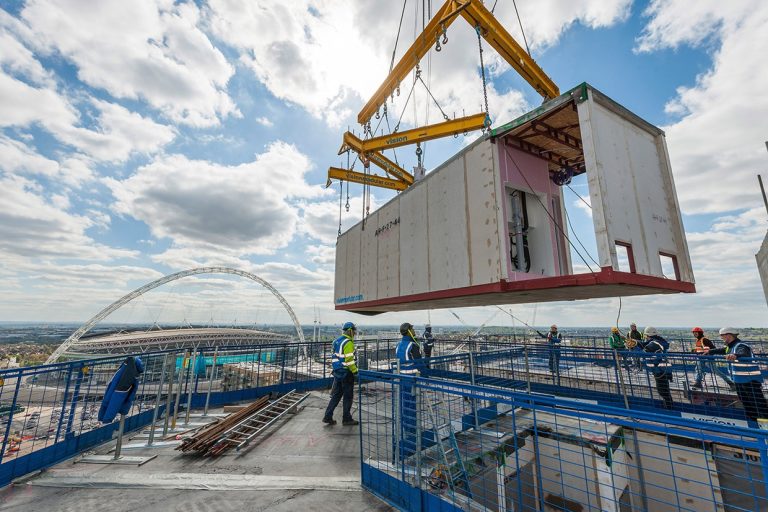Volumetric offsite methods offer complete solutions to housing, hospitals, student accommodation, office buildings and schools. Amongst other advantages, volumetric offsite construction brings to the factory all critical activities linked to the structure, mechanical and electrical work as well as to the exterior and interior finishes, including special equipment. A Volumetric approach ensures better quality control, but also limits the work to be carried on site to groundwork and foundations, connection to services, and minor finish work. As a result of this, volumetric offsite methods have the potential to help achieve a waste reduction of up to 90% on site compared to traditional construction. By bringing most trades within a controlled factory environment it has been proven that the generation of waste can be limited to less than 1.8% of the total weight of materials processed, and that appropriate recycling measures can limit the waste sent to landfill to less than 0.6%. Volumetric modular manufacturing is based on a lean design and procurement process that optimises the use of materials and ensures better management of resources. Utilising flexible modular construction systems, projects can be undertaken on designated sites that are unsuitable for conventional building developments. Offsite construction enables much of the work to be completed prior to delivery, controlling costs and minimising disruption on site. As a sustainable form of construction, modular buildings offer a unique approach to recycling. By reconfiguring used buildings they are able to breathe new life into existing structures, preserving the embodied energy from the original manufacturing phase and significantly reducing the use of materials. Modules are designed to be dismantled, relocated or recycled at any stage during their lifespan; this approach is integral to the build process, removing the requirement for demolition and in turn minimising the need for disposal in landfill sites. Prefabrication techniques produce a low-energy approach coupled with fast-track construction processes, both equating to minimised carbon emissions. Oliver Lowrie, Director for Ackroyd Lowrie is an architect and co-founder of Ackroyd Lowrie. He will be discussing ‘Optimising design for Volumetric production’ at Explore Offsite Outlooks. Oliver will be joined at Explore Offsite Outlooks by an outstanding speaker line-up that includes: Andrew Orriss, Sales Director – SIG360; Ben Lever, Future Skills Manager – CITB; John Eynon, Engagement Lead – BIM Alliance; Alan Clucas, Director – Explore Manufacturing – Laing O’Rourke… and more. For the full list of speakers go to: http://www.exploreoffsite.co.uk/2018-events/explore-offsite-outlooks/conference-speakers/ This one-day conference and exhibition will create a platform for clients and their professional advisers, contractors and project managers and offsite technology suppliers to network with industry experts to discuss the latest developments in digital construction for the offsite sector. The Explore Offsite Outlooks conference and supporting exhibition is taking place on 28 February 2018. Tickets cost just £125 + vat and includes entry into the conference and exhibition, lunch and refreshments. There will also be an optional guided tour of the BRE Innovation Park. To find out more or to secure your place at Explore Offsite Outlooks go to: www.exploreoffsite.co.uk/book





